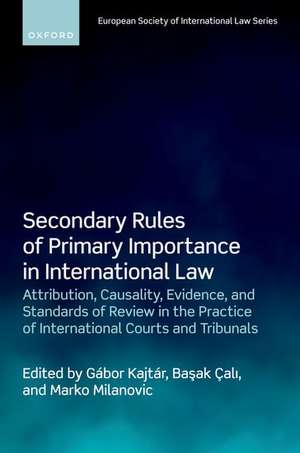Secondary Rules of Primary Importance in International Law: Attribution, Causality, Evidence, and Standards of Review in the Practice of International Courts and Tribunals: European Society of International Law
Editat de Gábor Kajtár, Basak Çali, Marko Milanovicen Limba Engleză Hardback – 28 noi 2022
Preț: 660.30 lei
Preț vechi: 750.37 lei
-12% Nou
Puncte Express: 990
Preț estimativ în valută:
126.35€ • 135.11$ • 105.35£
126.35€ • 135.11$ • 105.35£
Carte disponibilă
Livrare economică 17-22 martie
Preluare comenzi: 021 569.72.76
Specificații
ISBN-13: 9780192869012
ISBN-10: 0192869019
Pagini: 368
Dimensiuni: 164 x 241 x 25 mm
Greutate: 0.71 kg
Editura: OUP OXFORD
Colecția OUP Oxford
Seria European Society of International Law
Locul publicării:Oxford, United Kingdom
ISBN-10: 0192869019
Pagini: 368
Dimensiuni: 164 x 241 x 25 mm
Greutate: 0.71 kg
Editura: OUP OXFORD
Colecția OUP Oxford
Seria European Society of International Law
Locul publicării:Oxford, United Kingdom
Recenzii
This book has risen brilliantly to the challenge of confronting the complex and under-researched questions raised by the secondary rules of international law of state responsibility. Deconstructing the implicit hierarchy between primary norms and the rules that serve to implement them by showing how the latter can, through the way adjudicators implement them, shape the former is a timely project, a quarter of a century after the finalization of the ILC's articles on States' responsibility but also after the proliferation of jurisdictional mechanisms that have become their primary operators. To find out whether these rules are general - or why they are not - is a remarkably original and fruitful angle to reflect on the legitimacy of the jurisdictional decisions that specify them and their impact on the coherence of international law.
This is a timely volume. How international courts apply and shape international law, and what outcomes they reach, is largely determined by secondary rules of international law. Such rules help understand why courts reach certain conclusions in one case and other conclusions in another case, even though the applicable rules of international law and the facts may be largely similar. This volume brings together rich contributions by practitioners and scholars on such secondary rules, that advance our understanding of the practice of international courts and their contribution to the development of international law.
This is a timely volume. How international courts apply and shape international law, and what outcomes they reach, is largely determined by secondary rules of international law. Such rules help understand why courts reach certain conclusions in one case and other conclusions in another case, even though the applicable rules of international law and the facts may be largely similar. This volume brings together rich contributions by practitioners and scholars on such secondary rules, that advance our understanding of the practice of international courts and their contribution to the development of international law.
Notă biografică
Gábor Kajtár is Associate Professor in International Law at ELTE Law School Budapest. He holds a Law degree, an MA in Political Sciences, and an LL.M. degree from the University of Cambridge (2007). His Ph.D. dissertation concerned the self-defence against non-state actors and was awarded the Pro Dissertatione Iuridica Excellentissima Award, given to the best legal PhD dissertation in 2013-2014 by the Hungarian Academy of Sciences. Dr. Kajtár was a Visiting Researcher at Harvard Law School in the academic year 2015/2016, a Leibniz Fellow at the Max Planck Institute in Heidelberg in 2017, and a Visiting Fellow at the Lauterpacht Centre in 2019. Dr. Kajtár has been the coach of ELTE Jessup Team since 2009 and the ELTE Telders Team since 2016. In 2019 his team won the Jessup World Championship Final in Washington DC.Basak Çali is Professor of International Law at the Hertie School and Co-Director of the School's Centre for Fundamental Rights. She is an expert in international law and institutions, international human rights law, and policy. She has authored publications on theories of international law, the relationship between international law and domestic law, standards of review in international law, interpretation of human rights law, legitimacy of human rights courts, and implementation of human rights judgments. She is the Chair of the European Implementation Network and a Fellow of the Human Rights Centre of the University of Essex. She has acted as a Council of Europe expert on the European Convention on Human Rights since 2002. She has extensive experience in training members of the judiciary and lawyers across Europe in the field of human rights law. She received her PhD in International Law from the University of Essex in 2003.Marko Milanovic is Professor of Public International Law at the University of Nottingham School of Law and Co-Director of its Human Rights Law Centre. He is co-editor of EJIL: Talk!, the blog of the European Journal of International Law, as well as a member of the EJIL's Editorial Board. Professor Milanovic was formerly Vice-President and member of the Executive Board of the European Society of International Law. He held visiting professorships at Michigan Law School, Columbia Law School, Deakin Law School, the University of the Philippines College of Law, and the Geneva Academy of International Humanitarian Law and Human Rights.






